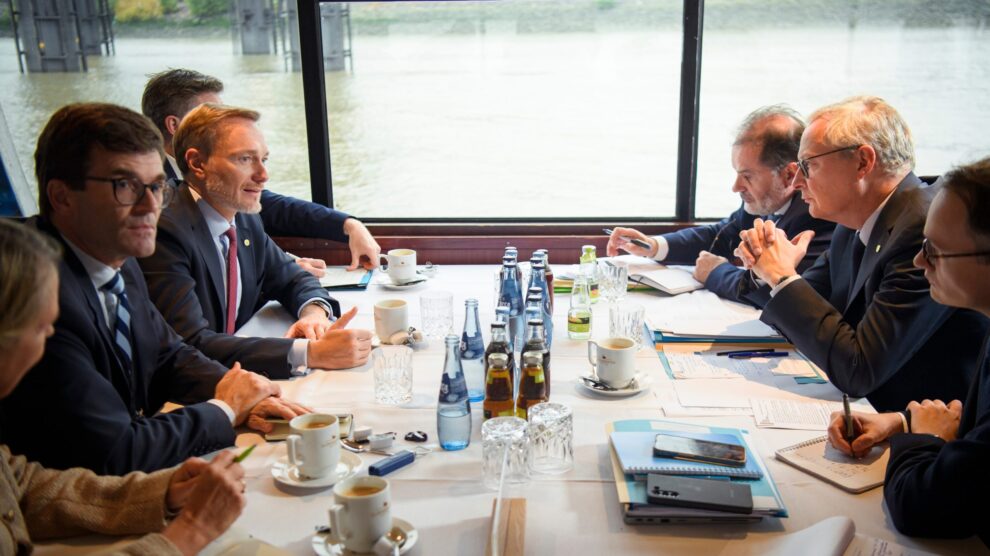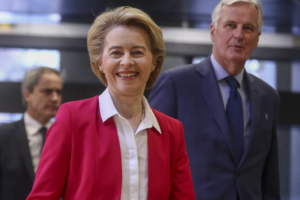Economic and finance ministers of the European Union made on Thursday significant progress on the reform of the bloc’s fiscal rules. But the final push depends on a Franco-German compromise.
An extraordinary meeting has been pencilled for later this month, hoping talks between Paris and Berlin will have borne fruit by then.
The two heavyweight capitals have embraced opposing views in the months-long debate, which needs to be resolved by year’s end to allow member states to design their next budgets under the new rules. Failure to do so will lead to the reactivation of the old norms, suspended since the onset of the COVID-19 pandemic.
France and Germany have in recent days intensified bilateral contacts to hash out their differences, raising expectations that a breakthrough will soon be in sight. French Finance Minister Bruno Le Maire met earlier this week with his German counterpart, Christian Lindner, in Paris and the two will get together again in Berlin in the coming days.
The talks focus on the most divisive issues of the fiscal overhaul, namely the numerical safeguards to guarantee an annual reduction of debt and deficit levels. France has so far resisted this idea, arguing that automatic and uniform norms would be counterproductive and potentially constrain economic growth. But Germany has firmly held its ground, backed by a group of member states, including the Netherlands, Austria, Sweden and Denmark, who want to ensure public spending is effectively kept in check.
The latest « landing zone » circulated by Spain, the country that currently holds the EU Council’s rotating presidency, left blank the percentage points of the debt-reduction and deficit-controlling mechanisms, suggesting this will be the very last hurdle to be jumped.
« It is progress that the idea of safeguards and benchmarks is acknowledged with regard to the debt-to-GDP ratio and the annual deficit. But what has to be considered is the level of ambition, » Lindner said on Thursday morning, before heading to the ministerial meeting in Brussels. « So now it is about numbers, not only instruments. I’m optimistic but much more work has to be done. »
« We’re in an open debate among partners and friends. It’s not about deadlines or red lines – it’s about horizons, » he added.
Le Maire described the Franco-German mood as « very positive and constructive » and said bilateral discussions were going « in the right direction. » He underlined the final outcome should bring forth fiscal rules that are « credible » and « solid » and leave enough financial space for countries to invest in high-tech and the green transition.
« What is at stake behind those negotiations is the whole credibility of the European Union, » Le Maire said. « Facing economic difficulties (and) geopolitical risks, there is a need to come to an agreement by the end of 2023, we cannot wait (until) 2024 with the perspective of the European elections. »
Two more meetings to go
What is on the table today is the reform of the Stability and Growth Pact, the fiscal rules that have guided the bloc’s finances since the late 1990s.
Under the present framework, member states are required to keep their budget deficits under 3% of gross domestic product (GDP) and their public debt levels below 60% in relation to GDP — thresholds that many governments exceed after years of intense spending to cushion a succession of overlapping crises.
In the legislative proposal presented in April, the European Commission kept untouched the 3% and 60% targets, which some economists consider arbitrary and obsolete, but made considerable alterations to the way in which the two figures should be met.
Each member state would be asked to design a mid-term fiscal plan to cut down its deficit levels at a credible pace and put public debt on a « plausible downward path ». The country-specific blueprints would be first negotiated between the European Commission and the capitals, and later approved by the EU Council.
The fiscal adjustments necessary to meet – or at least head towards – the 3% and 60% marks would be carried out over a period of four years and could be extended to seven years in exchange for further reforms and investments.
While the combination of fiscal sustainability and national ownership has been welcomed across the board, it has not been enough to speed up negotiations: capitals have spent the last months haggling over provisions of extreme technicality, including the debt-reduction safeguards.
Spain initially targeted Thursday’s meeting as the desired date to seal a deal on a revised legislative proposal. But following a series of « 50 meetings and contacts » with the other 26 member states, the presidency opted instead to table a « landing zone » to move forward the discussions, said Nadia Calviño, Spain’s acting economy minister.
« Today we see there is agreement on the core elements and mechanism of the new fiscal rules, » Calviño said after the ministerial meeting.
Building on the « significant progress » made on Thursday, she explained, the Spanish presidency will translate the working document into a proper legal proposal, which will then be debated by ministers in an extraordinary meeting later this month.
Ideally, Calviño noted, the definitive deal will be sealed on 8 December, when economy and finance ministers are expected to gather again. Any possible Franco-German compromise will be « integrated » into the presidency’s work, she added.
« Our assessment is that we may need two (more meetings) to finalise and reach an agreement on the legal text, » Calviño said.
The Council’s potential agreement will then need to undergo negotiations with the European Parliament before coming into force sometime in early 2024.





































